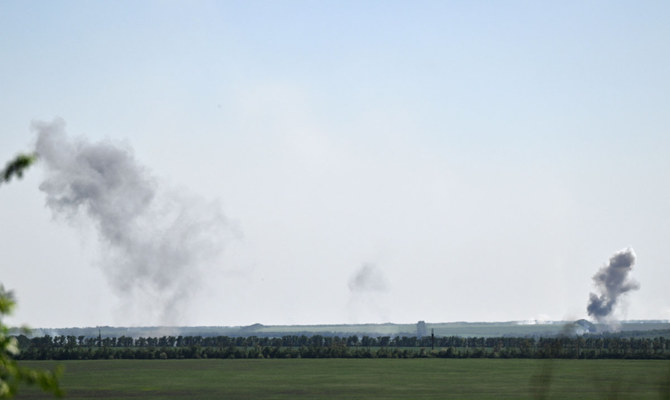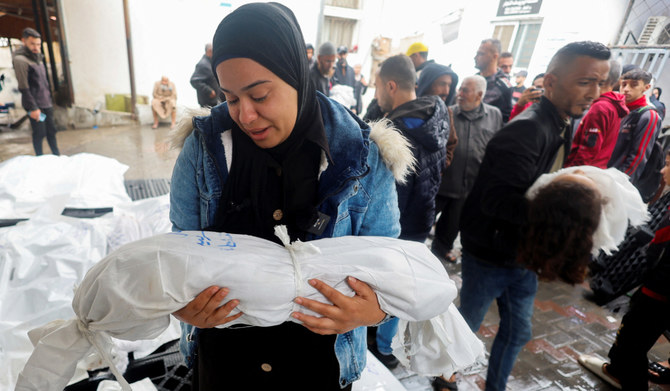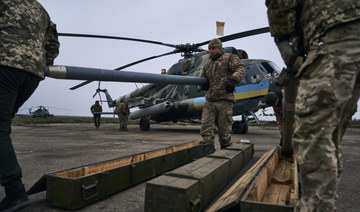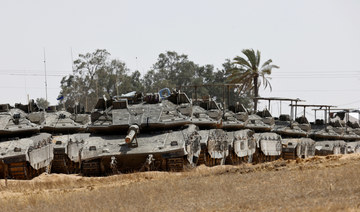KYIV/SIVERSK: Russia has stepped up a powerful assault on Soledar in eastern Ukraine, officials in Kyiv said, forcing Ukrainian troops to repel waves of attacks led by the Wagner contract militia around the salt mining town and nearby fronts.
Soledar, in the industrial Donbas region, lies a few miles from Bakhmut, where troops from both sides have been taking heavy losses in some of the most intense trench warfare since Russia invaded Ukraine nearly 11 months ago.
Ukrainian forces repelled an earlier attempt to take the town but a large number of Wagner Group units quickly returned, deploying new tactics and more soldiers under heavy artillery cover, Ukrainian Deputy Defense Minister Hanna Malyar said on Monday on the Telegram messaging app.
“The enemy literally step over the corpses of their own soldiers, using massed artillery, MLRS systems and mortars,” Malyar said.
Russia’s defense ministry did not mention either Soledar or Bakhmut in a regular media briefing on Monday, a day after facing criticism for an apparently false claim of a missile strike on a temporary Ukrainian barracks.
Wagner was founded by Yevgeny Prigozhin, an ally of Russian President Vladimir Putin. Drawing some recruits from Russia’s prisons and known for uncompromising violence, it is active in conflicts in Africa and has taken a prominent role in Russia’s war effort in Ukraine.
Prigozhin has been trying to capture Bakhmut and Soledar for months at the cost of many lives on both sides. He said on Saturday its significance lay in a network of cavernous mining tunnels below the ground, which can hold big groups of people as well as tanks and other war machines.
Ukrainian military analyst Oleh Zhdanov said fighting in Bahkmut and Soledar is “the most intense on the entire frontline,” with little advancement by either side in the freezing conditions.
“So many (pro-Russian fighters) remain on the battlefield ... either dead or wounded,” he said on YouTube.
“They attack our positions in waves, but the wounded as a rule die where they lie, either from exposure as it is very cold or from blood loss. No one is coming to help them or to collect the dead from the battlefield.”
Reuters could not immediately verify battlefield reports.
NO BUILDINGS INTACT
Ukrainian President Volodymyr Zelensky said in nightly video remarks on Monday that Bakhmut and Soledar were holding on despite widespread destruction.
He cited new and fiercer attacks in Soledar, where he said no walls have been left standing and the land is covered with Russian corpses.
“Thanks to the resilience of our soldiers in Soledar, we have won for Ukraine additional time and additional strength,” Zelensky said. He did not spell out what he meant by gaining time or strength.
But Ukrainian officials, led by the commander in chief General Valery Zaluzhniy, have warned that Russia is preparing fresh troops for a new, major offensive on Ukraine, possibly on the capital Kyiv.
Zelensky also appears to be banking on securing more, sophisticated weapons from Ukraine’s Western partners to beat off attacks and eventually expel Russian troops.
On Monday, he pressed on with diplomatic efforts, speaking to Petr Fiala, Prime Minister of the Czech Republic, current chair of the 27-member European Union.
“I am certain that our soldiers at the front will get these weapons and equipment. Very soon,” he said.
France, Germany and the United States all pledged last week to send armored fighting vehicles, fulfilling a long-standing Ukrainian request. Britain is considering supplying Ukraine with tanks for the first time, Sky News reported, citing a Western source. Britain’s Defense Ministry did not comment.
Iran could be contributing to war crimes in Ukraine by providing drones to Russia, White House national security adviser Jake Sullivan said on Monday.
The United States has imposed sanctions on companies and people it accused of producing or transferring Iranian drones used by Russia. The White House said last week it is considering ways to target Iran’s production of the unmanned weaponized aircraft through sanctions and export controls.
WAVES OF ATTACK
Military analysts say the strategic military benefit for Russia of capturing Bakhmut and Soledar would be limited.
Taras Berezovets, a Ukrainian journalist, political commentator and officer in the Ukrainian army, said capturing Soledar made little sense, except as a personal victory for Prigozhin, however it would be easier to take than Bakhmut.
“It’s his personal war,” Berezovets said on YouTube.
A US official has said Prigozhin is eyeing the salt and gypsum from the mines, believed to extend over 100 miles underground and contain auditorium-scale caverns.
Berezovets said Ukrainian troops fighting in Bakhmut and Soledar say attacks come in waves of small groups, no more than 15, with the first wave usually wiped out. The pro-Russian forces retrench and leave white ribbons for the next wave to follow.
“The complexity of fighting in cities like Bakhmut and Soledar is that it is hard to determine who is with you and who is the enemy,” he said.
In an evacuee center in nearby Kramatorsk, Olha, 60, said she had fled Soledar after moving from apartment to apartment as each was destroyed in tank battles.
“There isn’t one house left intact. Apartments were burning, breaking in half,” said Olha, who gave only her first name.
Fierce fighting in Ukraine’s Soledar leaves battlefield strewn with corpses — Zelensky
https://arab.news/9c6q7
Fierce fighting in Ukraine’s Soledar leaves battlefield strewn with corpses — Zelensky

- Zelensky says no walls left standing in Soledar
- Wagner Group sending waves of fighters, Ukraine says
PM Modi votes as India’s marathon election heats up

- Modi’s ruling Bharatiya Janata Party is expected to win India’s election convincingly
- Indian PM has stepped up rhetoric on India’s main religious divide in bid to rally voters
AHMEDABAD, India: Hindu nationalist Prime Minister Narendra Modi cast his ballot Tuesday in India’s ongoing general election after giving several inflammatory campaign speeches accused of targeting minority Muslims.
Turnout so far has dropped significantly compared with the last national poll in 2019, with analysts blaming widespread expectations that Modi will easily win a third term and hotter-than-average temperatures heading into the summer.
Modi walked out of a polling booth early morning in the city of Ahmedabad while holding up a finger marked with indelible ink, flanked by security personnel and cheered by supporters.
“Voted in the 2024 Lok Sabha elections,” Modi said on social media platform X, referring to India’s lower house of parliament.
“Urging everyone to do so as well and strengthen our democracy.”
The premier’s ruling Bharatiya Janata Party (BJP) is expected to win the election convincingly, but since the vote began on April 19, Modi has stepped up his rhetoric on India’s main religious divide in a bid to rally voters.
He has used public speeches to refer to Muslims as “infiltrators” and “those who have more children,” prompting condemnation from opposition politicians, who have complained to election authorities.
Modi has also accused Congress, the main party in the disparate opposition alliance competing against him, of planning to reallocate the nation’s wealth to Muslim households.
“This is the first time in a long time that he is so direct,” said Hartosh Singh Bal, executive editor at news magazine The Caravan.
“I haven’t seen him be this directly bigoted, usually he alludes to bigotry,” he added.
“The comments on wealth redistribution are targeting something from the Congress manifesto that just does not exist and that is frankly quite unfortunate.”
Modi remains widely popular a decade after coming to power, in large part due to his government’s positioning the nation’s majority faith at the center of its politics, despite India’s officially secular constitution.
In January, the prime minister presided over the inauguration of a grand temple to the deity Ram, built on the site of a centuries-old mosque razed by Hindu zealots decades earlier.
Construction of the temple fulfilled a long-standing demand of Hindu activists and was widely celebrated across India, with extensive television coverage and street parties.
Modi’s brand of Hindu-nationalist politics has in turn made India’s 220-million-plus Muslim population increasingly anxious about their future in the country.
The election commission has not sanctioned Modi for his remarks despite its code of conduct prohibiting campaigning on “communal feelings” such as religion.
India’s election is conducted in seven phases over six weeks to ease the immense logistical burden of staging the democratic exercise in the world’s most populous country.
Much of southern Asia was hit by a heatwave last week that saw several constituencies vote in searing temperatures.
In the city of Mathura, not far from the Taj Mahal, temperatures crossed 41 degrees Celsius (106 degrees Fahrenheit) on polling day, and election commission figures showed turnout dropping nearly nine points to 52 percent from five years earlier.
An analysis of turnout data published by The Hindu newspaper concluded it was too early to determine whether hot weather was impacting voter participation.
But India’s weather bureau has forecast more heatwave spells to come in May and the election commission formed a taskforce last month to review the impact of heat and humidity before each round of voting.
High temperatures were forecast for several locations voting on Tuesday including the states of Madhya Pradesh and Bihar.
Years of scientific research have found climate change is causing heatwaves to become longer, more frequent and more intense.
More than 968 million people are eligible to vote in the Indian election, with the final round of polling on June 1 and results expected three days later.
Ground invasion of Rafah would be ‘intolerable,’ UN chief warns

- Israel has killed more than 34,700 Palestinians, around two-thirds of them children and women, according to Gaza health officials
UNITED NATIONS, United States: A ground invasion of Rafah would be “intolerable,” UN Secretary-General Antonio Guterres said Monday, calling on Israel and Hamas “to go an extra mile” to reach a ceasefire deal.
“This is an opportunity that cannot be missed, and a ground invasion in Rafah would be intolerable because of its devastating humanitarian consequences, and because of its destabilizing impact in the region,” Guterres said as he received Italian President Sergio Mattarella.
UK military personnel’s data accessed in hack, BBC reports

- MPs could be informed about the development in the Commons on Tuesday
Some personal information in a payroll system used by Britain’s defense department has been accessed in a data breach, the BBC reported on Monday.
The system was managed by an external contractor and no operational Ministry of Defense data was obtained, the broadcaster said, adding that the department took the system off-line immediately.
Information like names and bank details of current and some former members of the Royal Navy, Army and Air Force was compromised, according to the report.
The Ministry of Defense did not immediately respond to a Reuters’ request for comment outside working hours.
MPs could be informed about the development in the Commons on Tuesday, the report added.
Russia says it takes control of two more settlements in eastern Ukraine

- Russia has made slow but steady advances since taking Avdiivka in February, with a string of villages in the area falling to Moscow’s forces
MOSCOW: Russian forces have taken control of the settlements of Soloviove in Ukraine’s eastern Donetsk region and Kotliarivka further north in the Kharkiv region, the defense ministry said on Monday.
Ukraine’s military made no mention of either locality in its evening General Staff report. Kharkiv Regional Governor Oleh Syniehubov said on Monday that Kotliarivka, located near the town of Kupiansk, was one of several locations to come under Russian shelling.
But Ukrainian bloggers appeared to acknowledge that both villages were in Russian hands.
DeepState, a popular forum on the war, noted on Saturday that Kotliarivka had been captured by Russian forces and on Sunday said the neighboring village of Kyslivka was also in Russian hands.
DeepState reported that Soloviove, northwest of the Russian-held town of Avdiivka, had been taken by Russian forces last week.
Russia has made slow but steady advances since taking Avdiivka in February, with a string of villages in the area falling to Moscow’s forces.
UNICEF warns 600,000 children face ‘catastrophe’ in Rafah

- Calling again for a ceasefire and safe access for humanitarian organizations, the agency highlighted there are some 78,000 infants under age two sheltering in the city, along with 175,000 children under five who are affected by infectious disease
- Israel has killed more than 34,000 Palestinians in Gaza, mostly women and children, according to the health ministry in the Hamas-run territory
NEW YORK: Some 600,000 children packed into Gaza’s Rafah city face “further catastrophe,” UNICEF warned on Monday, urging against their forced relocation after Israel ordered an evacuation ahead of its long-threatened ground invasion.
“Given the high concentration of children in Rafah ... UNICEF is warning of a further catastrophe for children, with military operations resulting in very high civilian casualties and the few remaining basic services and infrastructure they need to survive being totally destroyed,” the UN children’s agency said in a statement.
It said Gaza’s youth were already “on the edge of survival,” with many in Rafah — where the agency said the population has soared to 1.2 million people, half of them children — already displaced multiple times and with nowhere else to go.
“More than 200 days of war have taken an unimaginable toll on the lives of children,” said UNICEF Executive Director Catherine Russell.
“Rafah is now a city of children, who have nowhere safe to go in Gaza,” she said, warning that a large-scale military operation by Israel would bring “chaos and panic, and at a time where (children’s) physical and mental states are already weakened.”
UNICEF estimates that Rafah’s population has swelled to nearly five times its normal figure of 250,000 residents.
Calling again for a ceasefire and safe access for humanitarian organizations, the agency highlighted there are some 78,000 infants under age two sheltering in the city, along with 175,000 children under five who are affected by infectious disease.
Gaza’s bloodiest-ever war began following Hamas’s unprecedented Oct. 7 attack on Israel.
Israel has conducted a retaliatory offensive that has killed at least 34,735 people in Gaza, according to the Hamas-run
territory’s Health Ministry.
Of that toll, more than 14,000 are children, the ministry has said.
Israeli Prime Minister Benjamin Netanyahu has vowed to send ground troops into Rafah regardless of any truce, despite concerns from the US, other countries, and aid groups.
Hamas official Izzat Al-Rashiq said in a statement that any Israeli operation in Rafah would put the truce talks in jeopardy.
Senior Hamas official Sami Abu Zuhri said the evacuation order was a “dangerous escalation” that would have consequences.
“The US administration, alongside the occupation, bears responsibility for this terrorism,” the official said.
Hamas said later in a statement that any offensive in Rafah would not be a “picnic” for Israeli forces and said it was fully prepared to defend Palestinians there.
Aid agencies have warned that the evacuation order will lead to an even worse humanitarian disaster in the crowded coastal enclave of 2.3 million people reeling from seven months of war.
“Forcing 1 million displaced Palestinians from Rafah to evacuate without a safe destination is not only unlawful but would lead to catastrophic consequences,” British charity ActionAid said.
Nick Maynard, a British surgeon trying to leave Gaza on Monday, said in a voice message from the Gaza side of the Rafah crossing into Egypt: “Two huge bombs have just gone off immediately outside the crossing. There’s a lot of gunfire as well about 100 meters from us. We are very unclear whether we will get out.”
“Driving through Rafah, the tension was palpable with people evacuating as rapidly as they could.”
Witnesses said the areas in and around Rafah where Israel wants to move people are already crowded with little room for more tents.
“The biggest genocide, the biggest catastrophe, will take place in Rafah. I call on the whole Arab world to interfere for a ceasefire — let them interfere and save us from what we are in,” said Aminah Adwan, a displaced Palestinian.
Israel has been threatening to launch incursions in Rafah, which it says harbors thousands of Hamas fighters and potentially dozens of hostages.
Victory is impossible without taking Rafah, it says.

















